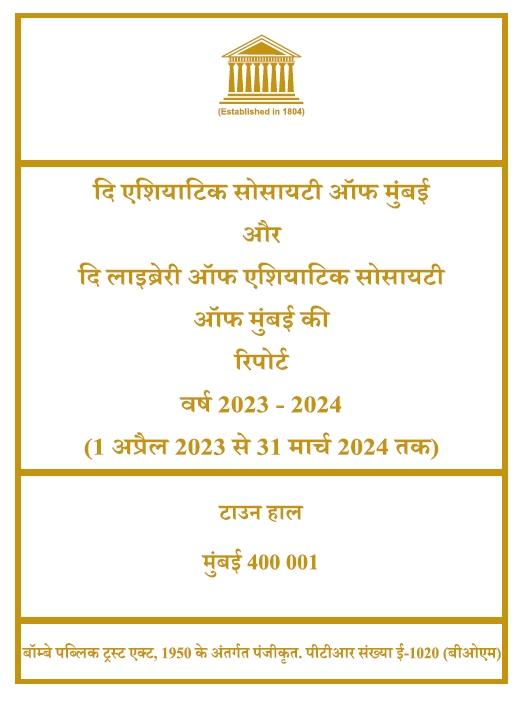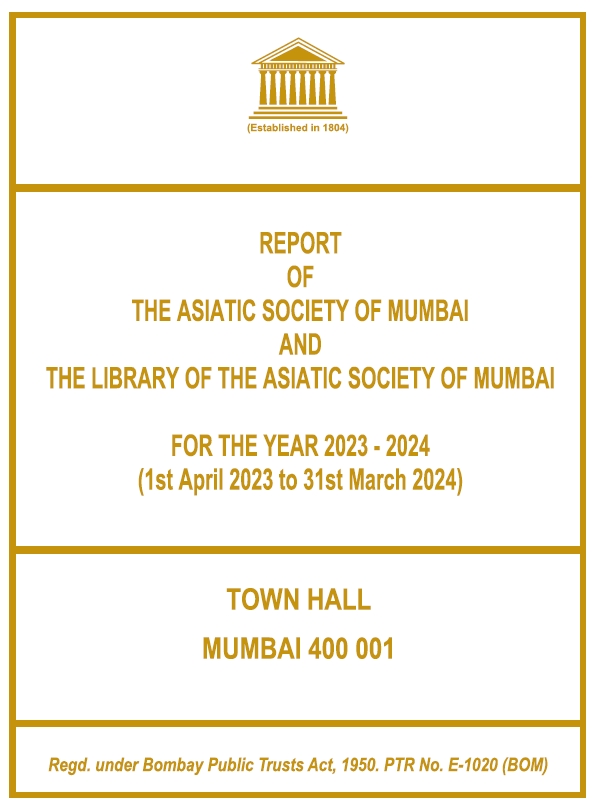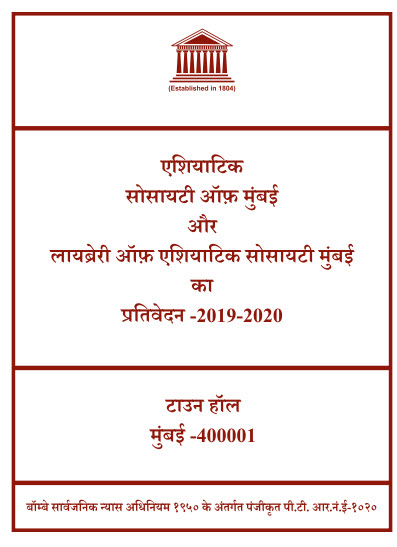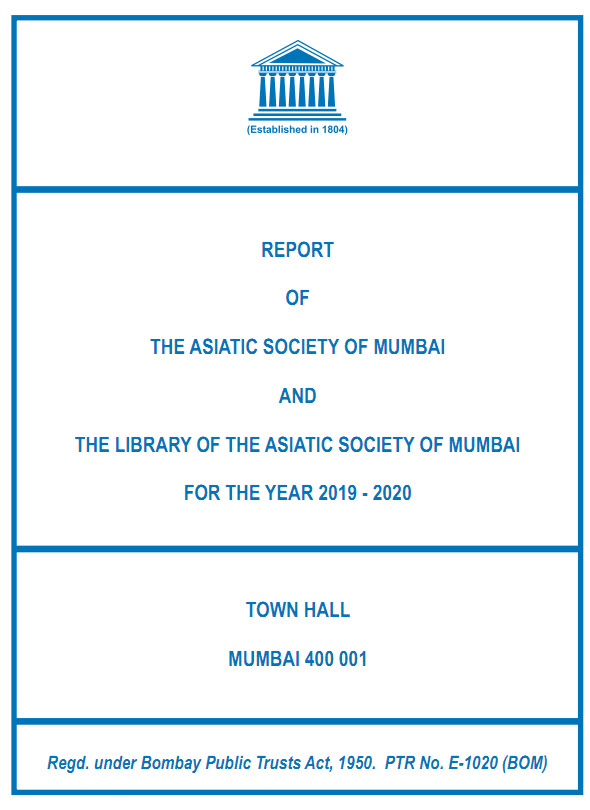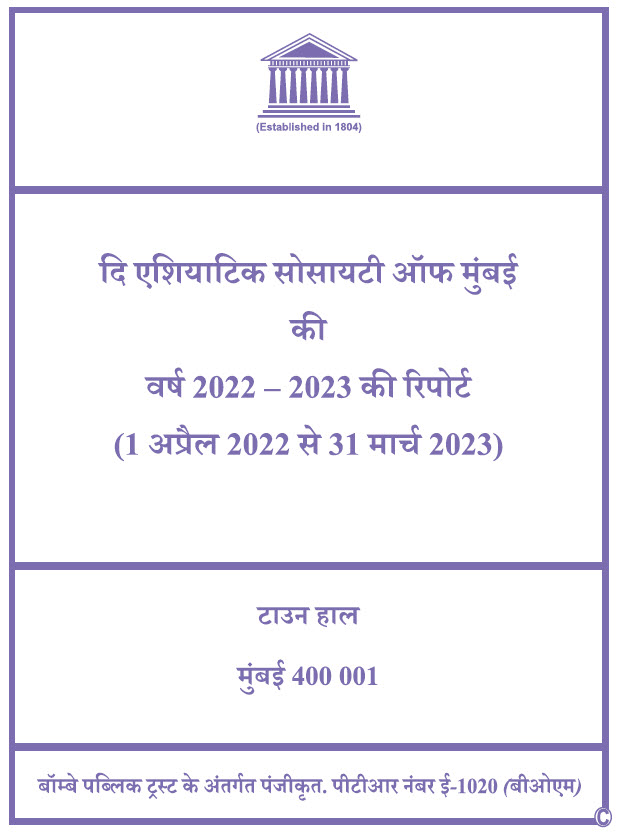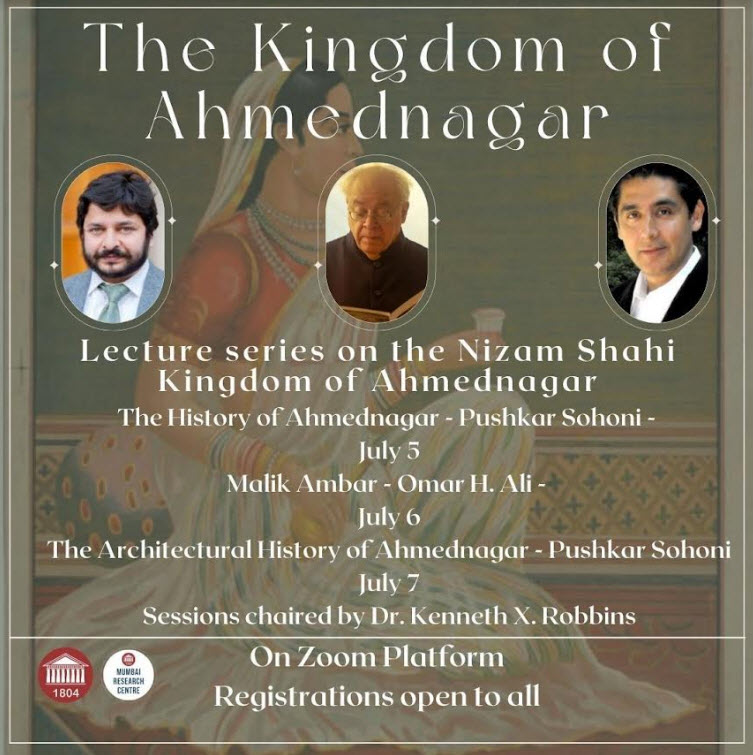 From 1490 to 1636, the Nizam Shahi kingdom of Ahmadnagar was one of the Deccani sultanates. One of its cities Daulatabad was the strategic gateway to the North Deccan. The great Bhakti saint-poet Eknath was a disciple of Janarden Swami who was governor of Daulatabad’s fort. There are extraordinary dargahs and tombs of notables in and near the city of Khuldabad.
From 1490 to 1636, the Nizam Shahi kingdom of Ahmadnagar was one of the Deccani sultanates. One of its cities Daulatabad was the strategic gateway to the North Deccan. The great Bhakti saint-poet Eknath was a disciple of Janarden Swami who was governor of Daulatabad’s fort. There are extraordinary dargahs and tombs of notables in and near the city of Khuldabad.
Its paintings, architecture, spiritual heritage, and unique history are thrilling. Only a few miniature paintings and drawings have survived ,but they are magical. The paintings have gold backgrounds or energetic coloring that overwhelms the onlooker , whereas the delicate lines of the drawings drew us closer and closer to appreciate them.
Particularly intriguing is the story of Malik Ambar, an Abyssinian slave who took control of the state. He is still known today for his defense of the Deccan against the Mughals. One of the fascinating paintings was commissioned by the Mughal Emperor Jahangir; it shows Jahangir imagining shooting an arrow through his nemesis Malik Ambar’s head.
The series of three lectures are free. Please join the whatsaap group to register and know more.
From 7 pm to 8.30 pm IST
1:30 pm to 3:00 pm GST
9:30 am to 11:00 am ET
Zoom platform
https://chat.whatsapp.com/CkmLFwTqFFE6kEdwELMNTk
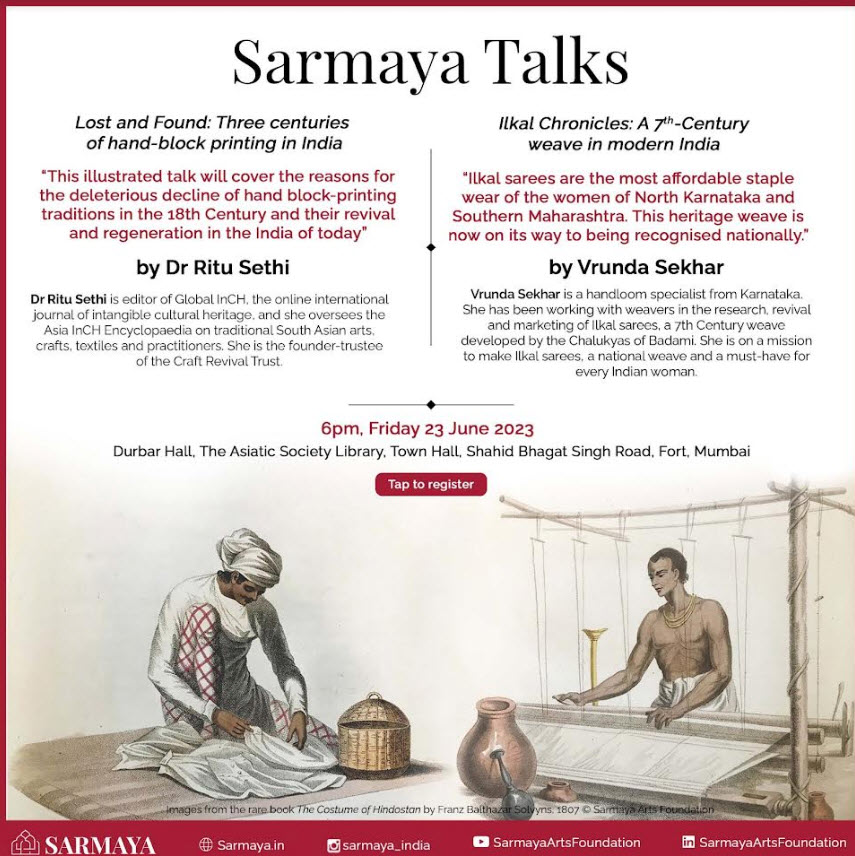 Sarmaya Arts Foundation is excited to host its series, Sarmaya Talks at the Durbar Hall, The Asiatic Society of Mumbai on 23rd June, 2023 from 6 pm onwards.
Sarmaya Arts Foundation is excited to host its series, Sarmaya Talks at the Durbar Hall, The Asiatic Society of Mumbai on 23rd June, 2023 from 6 pm onwards.
Sarmaya Talks is a space for conversations where we invite scholars, authors, and experts to speak on a topic of their choice, introducing our audience to a wide range of subjects from art, culture, and history. We have hosted a diverse range of speakers including Ira Mukhoty, Rudrangshu Mukherjee, Rana Safvi, Girish Shahane, Madhavi Menon, Bijoy Jain, V Sriram, Manu Pillai, Devdutt Pattanaik and Javed Akhtar. Sarmaya Talks is a two-speaker format event.
Our sessions for the evening are:
Lost and Found: Three Centuries of hand-block Printing in India by Dr. Ritu Sethi
Ilkal Chronicles: A 7th Century weave in modern India by Vrunda Sekhar
Friday, 23rd June, 2023
6 pm onwards
Durbar Hall
The Asiatic Society of Mumbai
About the Speakers:
Dr. Ritu Sethi is the editor of Global InCH, the online international journal of intangible cultural heritage, and she oversees the Asia InCH Encyclopaedia on traditional South Asian arts, crafts, textiles, and practitioners. She is the founder-trustee of the Craft Revival Trust.
Vrunda Sekhar is a handloom specialist from Karnataka. She has been working with weavers in the research, revival, and marketing of Ilkal sarees, a 7th-century weave developed by the Chalukyas of Badami. She is on a mission to make Ilkal sarees, a national weave and a must-have for every Indian woman.
The event is free for all with limited seating. To register, please click here. https://docs.google.com/forms/d/e/1FAIpQLSfbaAPySJKn72Yr4tgo5ZRKKBcxeK9ywy-mZxKWEB5Q8LZMLA/viewform
We look forward to seeing you at the event.
THE ASIATIC SOCIETY OF MUMBAI
The Literary Club of the Asiatic Society of Mumbai
invites you to a performance titled “ABHAYA” a one woman show
written & directed by Meena Naik, performed by Chinmayi Swami,
on Friday 30th June 2023 at 5 p.m.
The Literary Club of the Asiatic Society of Mumbai is pleased to invite you to a performance titled “ABHAYA” a one woman show, written & directed by Meena Naik, performed by Chinmayi Swami, on Friday 30th June 2023 at 5 p.m. in the Durbar Hall of the Society.
On 19 June 2012, the POCSO Act was brought into existence to protect and safeguard the interest of children at every stage of the judicial process, by incorporating child-friendly mechanisms for reporting, recording of evidence, investigation and speedy trial of offenses through designated Special Courts.
ABHAYA portrays the journey of an adolescent girl who has suffered the pain of sexual abuse and her fight for justice. It is the story of a 15-year-old girl, Abhaya, who gets molested by a stranger on the streets. She raises her voice and fights for justice. In the process, she faces three systems: police, medical and court. The POCSO Act helps her seek justice.
This 60-minute interactive play encourages adolescents to raise their voices and stage protests. Our young children do not feel safe talking about the offenses they experience in their homes, by relatives, family friends and social elements. For a safe social environment, communication and dialogue with children are a must.
This play is part of an effort by Awareness through Art. Meena Naik is a well-known puppeteer, theatre personality and filmmaker, who was recently awarded the Sangeet Natak Akademi Award for 2020. She is also the recipient of several fellowships and awards.
Please be there in large numbers to support this worthy cause and help spread awareness about this form of evil in our society. There will be interaction with the team at the end of the performance.
Tea will be served at 4.30 pm.
- Prof. Mangala Sirdeshpande, Hon. Secretary, Asiatic Society of Mumbai
- Meenal Kshirsagar,Vice President of the Society & Chairperson - ASM Lit Club

The durbar hall is getting ready for you. There are a fresh set of rare maps coming your way. This time around, our exhibition, 'Mapped!' commemorates a century of surveys of the Indian sub-continent. Can't wait to share new learnings, new stories and a new selection of maps for you to gaze at!
The exhibition opens on 7th May at the Durbar Hall, Asiatic Society of Mumbai. Look forward to seeing each one of you there.
 Mumbai Research Centre Talk in collaboration with Centre for Heritage Management, Ahmedabad University Many Stories to Multi-Storeys Mumbai's Rapid Urban Development and Threats to Cultural Heritage on Monday 24th April 2023 from 5 - 7 pm
Mumbai Research Centre Talk in collaboration with Centre for Heritage Management, Ahmedabad University Many Stories to Multi-Storeys Mumbai's Rapid Urban Development and Threats to Cultural Heritage on Monday 24th April 2023 from 5 - 7 pm
Join this conversation between:
Dr Andre Baptista, Ar Kirtida Unwalla and Dr Kaiwan Mehta.
Moderated by Dr Neel Kamal Chapagan.
Sarmaya Talks
'Searching for Ashoka' by Nayanjot Lahiri
Friday, 28th April 2023 from 6 pm onwards
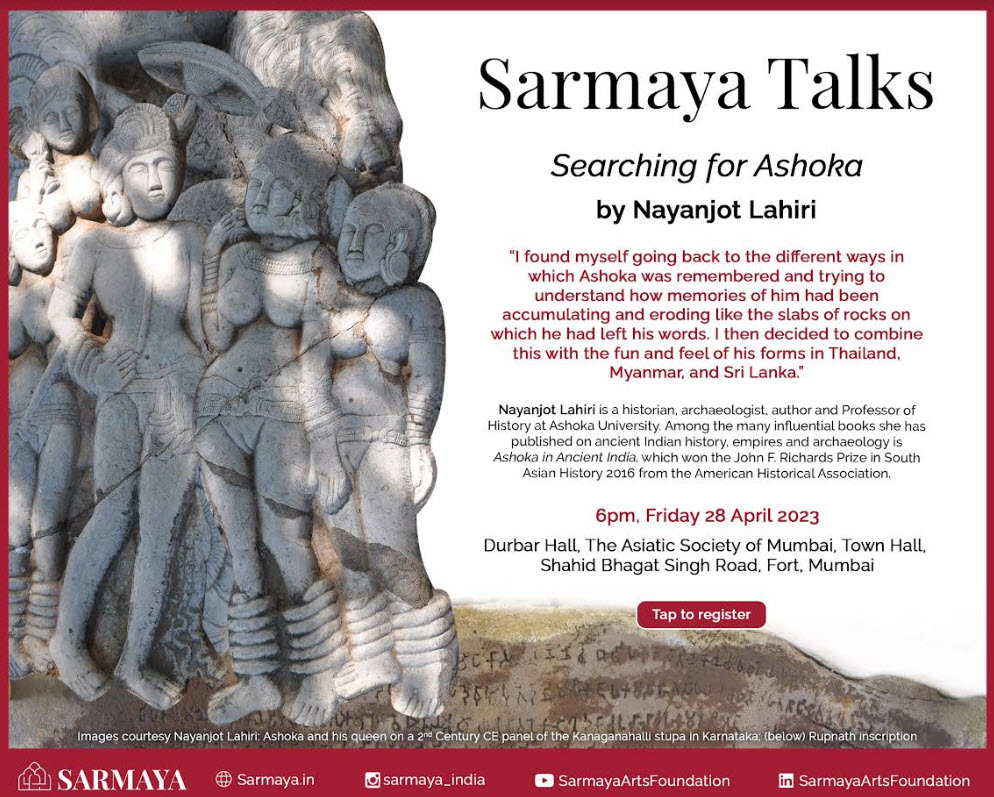
Sarmaya Arts Foundation is excited to host its series, Sarmaya Talks at the Durbar Hall, The Asiatic Society of Mumbai on Friday 28th April 2023 from 6 pm onwards.
Sarmaya Talks is a space for conversations where we invite scholars, authors, and experts to speak on a topic of their choice, introducing our audience to a wide range of subjects from art, culture, and history. We have hosted a diverse range of speakers including Ira Mukhoty, Rudrangshu Mukherjee, Rana Safvi, Girish Shahane, Madhavi Menon, Bijoy Jain, V Sriram, Manu Pillai, Devdutt Pattanaik and Javed Akhtar.
Our session for the evening is:
Searching for Ashoka by Nayanjot Lahiri
Nayanjot Lahiri is a historian, archaeologist, author, and Professor of History at Ashoka University. Among the many influential books she has published on ancient Indian history, empires, and archaeology is Ashoka in Ancient India, which won the John F. Richards Prize in South Asian History 2016 from the American Historical Association.
Kindly register yourself for the talk using the link given below:
https://docs.google.com/forms/d/e/1FAIpQLSdg4PYOIATT11dOxgHUNhS-sgbasQEHxsyQD9Yhjw7UqeqkhQ/viewform
Date of event: Friday 28th April 2023
Time: 6 pm onwards
Venue: Durbar Hall, The Asiatic Society of Mumbai















